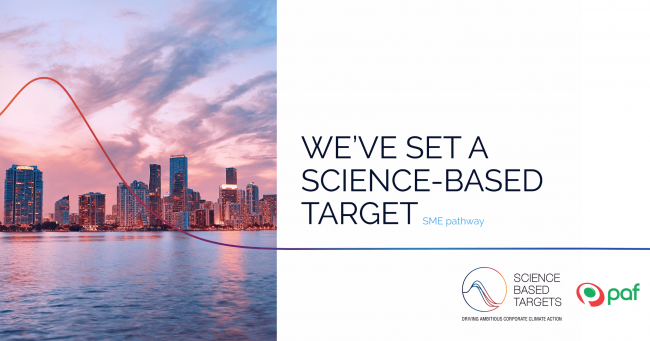Paf is raising the bar on climate action and is committed to reducing its climate impact in line with the Paris Agreement’s 1.5°C target. Paf has submitted a Science Based Target (SBT), which has now been approved by the Science Based Target initiative (SBTi).
“We have committed to reduce our greenhouse gas emissions in scope 1 and 2 by at least 46% by 2030 compared to 2019 emissions. We will also measure and reduce our scope 3 emissions,” says Daniela Johansson, Deputy CEO & Chief Responsibility Officer at Paf.
SBTi is a robust and scientific framework that provides climate targets and methodologies for companies around the world. The targets should be in line with what is required to keep global warming below 1.5°C.
Depending on their size, companies apply in different pathways to have their climate targets approved by SBTi. As Paf has fewer than 500 employees, the climate target was approved as an SBT-target for small and medium-sized enterprises.
Expanded measurements of scope 3
Since 2016, Paf has calculated its climate impact according to the GHG protocol, which is a method for measuring greenhouse gas emissions. With the approved SBT target, Paf is now expanding its calculations to include more categories in scope 3, where the greatest climate impact is found.
“Getting all the data needed in scope 3 requires a lot of detective work, but it is a process that is worth all the time and effort it takes,” says Anna Ingman, Environmental Specialist at Paf.
Within scope 3, Paf has previously calculated its climate impact in categories such as business travel, purchased phones and computers, and electricity consumption from servers and the physical gaming machines. The calculations are now being expanded to include more categories in scope 3, including employee commuting, waste management and capital goods.
“Together with our climate partner, we can identify our so-called ‘hotspots’ – areas in our value chain where our emissions are most significant and which we can directly influence,” says Anna Ingman.
This is SBTi
The Science Based Targets initiative is a collaboration between CDP, the UN Global Compact, World Resources Institute (WRI) and the World Wildlife Fund (WWF). The initiative was launched in the context of the 2015 Paris Agreement.
Scope 1 / Direct emissions
Direct greenhouse gas emissions from sources owned or controlled by Paf (in Paf’s case, company vehicles).
Scope 2 / Indirect emissions from purchased energy
Emissions from heating, cooling and production of electricity purchased by Paf.
Scope 3 / Indirect emissions from business activities
Indirect emissions caused by Paf’s activities such as business and customer travel, purchased technology, electricity consumption for physical games and server services, as well as capital goods, waste management and employee commuting to and from Paf offices. Scope 3 contains a total of 15 categories, eight of which are relevant to Paf’s operations.
18+ | Juegoseguro.es – Jugarbien.es



